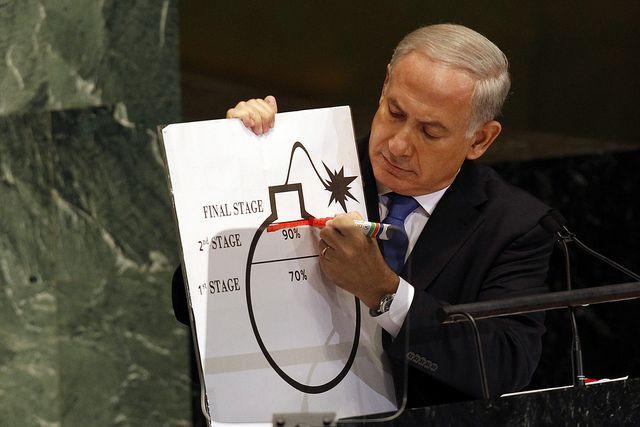With A Second Obama Term, Israel Looks Ahead to Its Own Elections, And Toward Iran

The U.S. presidential election was watched closely all over the world, but the outcome mattered particularly to Israel, where the enmity between Prime Minister Benjamin Netanyahu and U.S. President Barack Obama is anything but a secret.
It was also no secret that Republican challenger Mitt Romney was the favorite among Israelis (to the tune of 59 percent favorability rating, versus Obama's 22 percent) and the Israeli government (Romney and Netanyahu are old friends from the 1970s, when both worked at Boston Consulting after attending business school.)
Romney's unashamed declaration that Jerusalem is capital of Israel, a point the U.S. Democratic party and President Obama have deemed controversial, also helped his standing among American-Israelis, who strongly turned out in favor of Romney, the AP reported, by a factor of 85 percent.. Even before election day arrived, analysts were estimating that if Israel were a U.S. state, Romney would have carried it easily.
But Israelis arose on Wednesday morning with a continued Obama presidency. And now two questions hang over the Knesset in Jerusalem: What will Obama's second term mean for Israel's own elections in January? And what will Obama do, or not do, about the possibility of Iran getting nuclear weapons?
Predictably, there are some doomsayers, such as David Weinberg, whose column in Israel Hayom on Wednesday warned Israelis about Obama's "anti-Netanyahu campaign," and said that relations are sure to further wither if Netanyahu is re-elected, potentially leaving Israel in the lurch.
Similarly, Danny Danon, a Knesset member for Netanyahu's rightist Likud Party, called Obama "naive" and suggested that America had now left Israel to fend for itself, the Israel-focused U.S. newspaper The Algemeiner reported .
But others were more optimistic. Jonny Daniels, Danon's Chief of Staff, who recently revealed the he himself is mulling a Knesset run, said that an Obama second term could work in Netanyahu's favor for the January elections.
"This could really help Bibi [Netanyahu]," Daniels said, speaking from Tel Aviv. "There's a school of thought that Obama doesn't have to give in to the liberal base now, and might actually be better on this issue [of Iran]."
"Potentially, this could play out for the best," Daniels continued. "Bibi has to be very careful how he plays it. He doesn't want to be the Prime Minister that stands up to Obama, but he still needs to stand strong for Israel."
Standing up to pressure from a foreign president might be exactly what clinches the election for Netanyahu, Shmuel Sandler, a professor at Bar-Ilan University, told the Jewish Daily Forward .
“If he’s too rough with Netanyahu, it will be counter-productive,” said Sandler to the Forward. “It will make people rally around Netanyahu. People don’t like when someone from outside pressures us [Israelis].”
"The truth is, there's a limit to how much Obama can do to us," Daniels said, noting the Republican majority in the U.S. House of Representatives.
"I think if anything, this [Obama's re-election] brings war with Iran closer. There's definitely a level of mistrust between Obama and Bibi, that's for sure," he added.
Netanyahu is left in a rather awkward position now that he so vocally backed the losing horse. His statement congratulating Obama, released almost immediately after the election was officially called, was nothing if not an attempt to defuse tensions.
Netanyahu said that he will "continue to work with President Obama to ensure the interests that are vital for the security of Israel's citizens," but implied in an interview with Arutz Shtaim that Israel would act against Iran alone if it came down to it.
Obama's re-election also has some prominent Israel politicians weighing their own chances come January.
"People like [Tzipi] Livni [former Foreign minister and former head of the the opposition party Kadima] and [former Prime Minister Ehud] Olmert are waiting to see if they will re-enter politics," Daniels said, "And a lot of that is based on yesterday's [Wednesday's] election."
Israel's left-wing Haaretz newspaper has revealed that Livni has been pushing current Israeli President Shimon Peres to leave his post and run for head of Kadima, citing anonymous sources that say Livni "doesn't feel comfortable" being number two to Olmert and that Peres would be a stronger candidate to "topple" Netanyahu.
The Israeli elections are currently scheduled for January 22, 2013.
Correction: This story originally stated that Messrs. Romney and Netanyahu had met while at Harvard Business School, when in fact Mr. Romney went to Harvard while Mr. Netanyahu attended MIT. The two met while working at Boston Consulting.
© Copyright IBTimes 2024. All rights reserved.





















